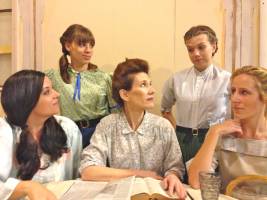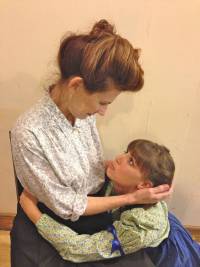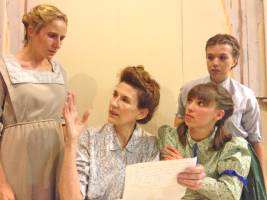
Four years had passed since the Equal Rights Amendment was sent to the states to be ratified and three since Roe vs. Wade became the law of the land when Kevin O’Morrison’s Ladyhouse Blues first sent mid-1970s audiences back to 1919, a year after the end of World War I and the watershed year the Senate ratified the Nineteenth Amendment, giving women the vote just as the 1920s began to roar.
Andak Stage Company now revives Ladyhouse Blues under the impeccable direction of Anne McNaughton, offering L.A. audiences an all-around splendid production, one that transports us back nearly a century to the end of a decade in which the times, were (as Bob Dylan was to put it forty-five years later) most definitely “a-‘changin’.”
 Kitty Swink plays Liz Madden, a homespun country woman in her early forties kept busy holding down the fort in St. Louis, Missouri, surrounded by her four young adult daughters as they await the coming home of only son Bud from war duty in Europe.
Kitty Swink plays Liz Madden, a homespun country woman in her early forties kept busy holding down the fort in St. Louis, Missouri, surrounded by her four young adult daughters as they await the coming home of only son Bud from war duty in Europe.
24-year-old Helen (Liza de Weerd) has returned to the Madden homestead following a sanitarium stay that did little to cure her rapidly advancing consumption (TB in today’s terms). Illness and the conspicuous absence of her German-American husband Heinz Otto and their young son have left Helen embittered, ill-tempered, and emotionally drained.
Second daughter Dot (Annie Matthews) is visiting from New York, conspicuously pregnant and, as Liz so plainly puts it, showing off some “highfalutin New York airs.” Terry (Kaylee Bouwens) is a budding feminist and union supporter. 16-year-old Eylie (Tro Shaw) has plans to quit her waitressing job and move out to California with her Greek-American boyfriend Johnny.
These five women live in a world almost entirely without men, their lives radically changed by America’s entry into The Great War, their homes transformed into “ladyhouses” with only those few males too old or infirm to fight having stayed behind.
Though her daughters (the youngest two in particular) have embraced these societal changes, particularly those relating to women’s roles, Liz holds steadfast to her belief that family and faith are everything. “Put your trust in the Lord an’ your children,” she declares in no uncertain terms, and “rest of the world can go to blazes.”
Act One allows us to get to know these five very different women over the course of an ordinary day August day. Act Two has them facing life-altering challenges in different and occasionally unexpected ways.
Antaeus Company treasure Swink, on a rare detour from the erudite, sophisticated women she usually portrays, vanishes inside the unworldly skin of a woman who would be right at home amongst today’s Tea Partiers in her distaste for immigrants and fear of anything not American. To her, them foreigners speak “in code,” and don’t get her started on the lyrics to “Ja-Da (Ja Da, Ja Da, Jing, Jing, Jing!).” Equally suspect are the “Bolsheviki” ideas that have entered daughter Terry’s head. Bible always at hand, Liz is firmly convinced that they are “livin’ in the End o’ Days” (how topical is that!), and if the folk in the Good Book happen to be foreigners, well everybody knows that at least they “talk English.”
 Swink has been impressive before as a member of the Scenie-winning ensembles of The Autumn Garden and Macbeth, but here she tops herself in her star turn as a woman who believes that family comes first, electricity and the telephone are the devil’s work, and “politics is all right for menfolks—keeps ‘em out of the kitchen till meal time.” Still, you’ve got to hand it to a woman whose second marriage ended the day her husband discovered his wife had no intention of changing her name a second time. And when things take a decidedly dark turn in Act Two, Swink rises to the occasion in a performance of grit, guts, valor, and deep maternal love.
Swink has been impressive before as a member of the Scenie-winning ensembles of The Autumn Garden and Macbeth, but here she tops herself in her star turn as a woman who believes that family comes first, electricity and the telephone are the devil’s work, and “politics is all right for menfolks—keeps ‘em out of the kitchen till meal time.” Still, you’ve got to hand it to a woman whose second marriage ended the day her husband discovered his wife had no intention of changing her name a second time. And when things take a decidedly dark turn in Act Two, Swink rises to the occasion in a performance of grit, guts, valor, and deep maternal love.
De Weerd once again proves herself one of our most gifted young actresses as the doomed Liz, a woman whose bitterness is well earned but nonetheless an irritant to those around her. As always, de Weerd conveys as much in her silences and reactions as in her words, and never once does she allow us to lose sight of Helen’s humanity, her fragility, and her grit.
The three younger daughters are each of them marvelous creations as well. Matthews lets us see beneath Dot’s icy, social-climbing surface as she nips drinks on the sly to ward off the pain; Bouwens gives us a Terry who’s a feisty, steely Betty Friedan-in-training; and Shaw’s delightful Eylie is a saucy romantic just awakening to her womanly powers.
 John Iacovelli’s excellent scenic design is a scaled-down version of the Madden home he would likely have created for the Pasadena Playhouse, allowing audiences in the 35-seat NewPlace Studio Theatre to feel as if they were right there in the kitchen with Liz and her girls. Furniture and properties have an authentic period look, though not without exceptions. (One can excuse the overly modern sink given budget limitations more easily than a front-and-center plastic tablecloth.) Dean Cameron’s generally well thought-out 1919 costumes may not all be exactly what you’d see in photos of the era, but they do the trick quite nicely. The women have taken care to approximate hairstyles of the era, though Boewen’s contemporary bob is decidedly anachronistic, and not the one shown in production stills. Dakin Matthews’ sound design is pretty darned perfect whatever the budget, giving us the occasional male voice of street vendors, an evangelist, and at one point, of an unseen someone at the front door.
John Iacovelli’s excellent scenic design is a scaled-down version of the Madden home he would likely have created for the Pasadena Playhouse, allowing audiences in the 35-seat NewPlace Studio Theatre to feel as if they were right there in the kitchen with Liz and her girls. Furniture and properties have an authentic period look, though not without exceptions. (One can excuse the overly modern sink given budget limitations more easily than a front-and-center plastic tablecloth.) Dean Cameron’s generally well thought-out 1919 costumes may not all be exactly what you’d see in photos of the era, but they do the trick quite nicely. The women have taken care to approximate hairstyles of the era, though Boewen’s contemporary bob is decidedly anachronistic, and not the one shown in production stills. Dakin Matthews’ sound design is pretty darned perfect whatever the budget, giving us the occasional male voice of street vendors, an evangelist, and at one point, of an unseen someone at the front door.
Sarah Williams is stage manager. Ladyhouse Blues is produced by the powerhouse husband-and-wife team of Matthew and McNaughton. Michael Curran-Dorsano is associate producer.
A fascinating portrait of five women living at a time when women’s roles were beginning to change in significant ways and a showcase for five very talented L.A.-based stage actresses, Ladyhouse Blues is one revival that theatergoers won’t want to miss. With Saturday matinees a feature of its four-performance-a-week schedule, even the most avid playgoer won’t have to skip this gem of a production.
NewPlace Studio Theatre, 10950 Peach Grove St., North Hollywood.
www.andak.org
–Steven Stanley
March 2, 2013
Photos: Dakin Matthews


 Since 2007, Steven Stanley's StageSceneLA.com has spotlighted the best in Southern California theater via reviews, interviews, and its annual StageSceneLA Scenies.
Since 2007, Steven Stanley's StageSceneLA.com has spotlighted the best in Southern California theater via reviews, interviews, and its annual StageSceneLA Scenies.







 COPYRIGHT 2025 STEVEN STANLEY :: DESIGN BY
COPYRIGHT 2025 STEVEN STANLEY :: DESIGN BY